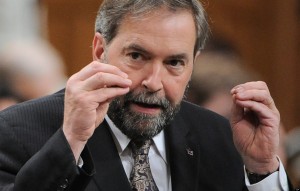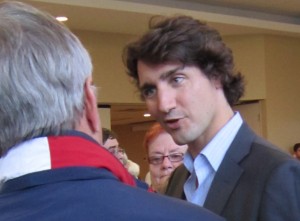August 28, 2015
BURLINGTON, ON
It’s messy out there and getting worse. Canada is in a recession, our second one in less than a decade. Oil and resource prices have collapsed and expectations are they’ll stay low for the foreseeable future. And all those jobs in the oil patch are disappearing since the tar sands are uneconomic at today’s oil prices. It’s little wonder that Albertans tossed out its provincial Conservatives and took a gamble on the NDP.

NDP leader Tom Mulcair asks a question during Question Period in the House of Commons. (AP Photo/The Canadian Press, Sean Kilpatrick)
Any economist worth his/her salt should have seen this coming. NDP leader Tom Mulcair, who is a lawyer, warned the federal government a couple years ago about this so-called ‘Dutch disease’, a consequence of putting all our economic eggs in one basket – focusing on the high life afforded by oil, only to see your world come crashing down when that market changes, as it did for the Netherlands a few decades ago.
All these so-called free trade deals and federal disinterest in anything but oil have helped gut Canada’s manufacturing sector. Over 300,000 manufacturing jobs have disappeared since 2004. And dropping our corporate income tax rates into the cellar has done nothing for the economy, except make the big oligopolist companies richer, allowing them to dispense even more obscene executive bonuses, and to hoard the rest of the cash. Even the big auto companies have shifted much of their production to our NAFTA partner Mexico, now replacing us as the largest North American car maker.
Over the horizon, the Trans-Pacific Partnership trade deal promises to wreck our productive dairy and egg industries, handing them on a platter to New Zealand’s milk monopoly and subsidized American farmers. The current federal government is ideologically opposed to marketing boards. It dismantled Canada’s wheat board a few years ago leaving many grain farmers stuck without a way to get their crop to market last year. Thanks to the drought, which has diminished grain yields, that will be less of a problem this year.

Prime Minister Harper, center, checks out the product at Ecosynthetix. Company CEO John van Leeuwen is on the left; Mike Wallace, Burlington’s MP brought home the bacon
The ‘Dutch disease’ has taken the Canadian dollar down by over a quarter, reducing our international standard of living by the same amount. A lower dollar means higher prices for imported goods so expect to see inflation re-emerge after a two-decade holiday – and bet on higher interest rates as the Bank of Canada tries to wrestle with that nasty little problem.
The cupboard is bare. Paul Martin’s budget surpluses have been squandered thanks to the tax cuts given to the wealthiest Canadians and big corporations. Eight straight years of federal deficits and we’ve added $150 billion to the red – not a good place to be when your economy is hitting the skids. And with current interest rates already near zero, government spending and income redistribution will be needed to fix this mess.
So like it or not we are in for more deficits – or a very long period of austerity. That is the choice facing Canadians as we go into this longest election period of recent history. Everybody makes mistakes, even big ones, as the current government did, gambling on the oil sands as Canada’s goose laying golden eggs into perpetuity.
Fortunately there is an election happening, an opportunity for our political leaders to tell us what they are going to do about fixing the economy. Poll-leading Mr. Mulcair’s main plank is to establish a national child day-care program, much like the one his predecessor, Jack Layton, killed by voting against the government in 2005. But unlike that one there is no provincial buy-in for such a program today, so his chances of success are slim.
Mr. Trudeau would reform the tax system slightly to rob the rich and give to the middle class. This would be stimulative since lower income folks spend more of their income on goods and services than the rich do. His announcements also include funding support for developing new technologies and building more much-needed municipal infrastructure.
Mr. Harper has offered a tax credit for membership in service clubs, but mostly is standing proud on his record. Some would say, given that record, he should be running away from, rather than showcasing his leadership of the Canada’s economy. In fact one on-line comment on the CBC website called it “The Worst Economic Record Since the Great Depression”.
 Ray Rivers writes weekly on both federal and provincial politics, applying his more than 25 years as a federal bureaucrat to his thinking. Rivers was a candidate for provincial office in Burlington where he ran as a Liberal against Cam Jackson in 1995, the year Mike Harris and the Common Sense Revolution swept the province. Rivers is no longer active with any political party.
Ray Rivers writes weekly on both federal and provincial politics, applying his more than 25 years as a federal bureaucrat to his thinking. Rivers was a candidate for provincial office in Burlington where he ran as a Liberal against Cam Jackson in 1995, the year Mike Harris and the Common Sense Revolution swept the province. Rivers is no longer active with any political party.
Background links:
Harper’s Economy Dutch Disease Election
Deficits Deficit Debate More Dollar Infrastructure Plans





















Don’t forget about an unemployment rate which is about half of what it used to be in the lovely 1980s. 12% unemployment in 1983. Surely that was the worst unemployment since the great depression? Who was running the show then?
That line has actually been used in many political campaigns – as far back as Bill Clinton when he first ran. But look how it is being abused today. Canada’s GDP declined in the first quarter by 0.6%, and is expected to decline again by somewhere around 0.9 % in the second quarter. The actual number will be out tomorrow. How about 1982 when GDP fell over 3%, or 1991 when it fell a good 2%. Do those periods not count?
The headline of this story says, “Rivers claims we are experiencing the worst economic record since the Great Depression.” Actually if you read teh story you realize that Rivers doesn’t claim that at all. He simply mentions that he say “one on-line comment on the CBC website” that made that claim.
Editor’s note: You are correct – we revised the headline. Thank you
The on-line comment from the CBC website was factual: The average economic growth rate (using GDP growth) for Stephen Harper’s government (2006-present) is 1.77 per cent which is the worst for any Canadian Government since the Great Depression.
OPEC is clever enough, and rich enough, to drop oil prices in order to destroy the highly successful American fracking and the oil sands interests, since they know those costs are way higher then just having your oil spurting out of the ground. When the western oil interests are devastated enough, the price will go through the roof again. When the oil prices go high enough to reignite western oil companies to start back up, well, rinse and repeat.
These developments seem to so closely mirror the disaster of the Reagan/Bush era and the subsequent (Boy George) Bush years that I have to wonder why, with such a glaring example right on the border Canada allowed itself to degenerate down this path. About all that’s missing is disastrous military adventurism.
Many to the south have long viewed Canada as mature and worldly wise. But reading this makes (Canadian) Naomi Klein ever so much more relevant. What’s that old saying about a prophet in his own land?
Ray – a measure of the economic health of a town or city is now many independent retailers and shops are open. On the surface this country looks ok, but dig a little deeper and you will see small business in trouble.
I can count in my industry how many small independent retailers who have closed because business is so bad. Consumers are holding back as people have been losing good jobs to Mexico, China or India. In the GTHA I can’t think of one new retailer that has opened in my industry since Harpo has taken office. Rather we have lost almost two dozen fabulous stores. Worse, those retailers still open who are getting older can’t sell their life’s work. Their retirement (ie the value of their business when sold to a younger generation) is worthless.
You don’t have to look far to see. In Milton we had a great gift retailer Delacourts. Some twenty plus years building a great business. No one stepped up to buy this business when she wanted to retire. So the built up value of her business was worthless. Why? Because we have been in a long period of decline from the last recession and the Federal government has done nothing to help small business.
Harpo talks about his record, seems proud about it. However, what we get is a small business that has gone, an owner who lost big in the dream of selling the business, a storefront empty, and several direct and indirect employees without a job, and those lost sales tax and income tax revenues.
Proud economic record Harpo? I say not.